Those who go on an Outward Bound expedition know the life-changing confidence, independence and support that result from the weeks spent in a new environment, with new people while forming new relationships. And while the vast majority of Outward Bound expeditions are focused on life-changing experiences, Intercept expeditions are focused on a little bit more. The Intercept program was created to bridge the gap between classic wilderness expeditions, where motivated teens experience a challenging and supportive environment to learn, test new skills, and experience adventure, and more therapeutic and correctional-type outdoor courses such as wilderness therapy. Note: We are not a wilderness therapy program, and to learn more about our key differences check out this blog. An Intercept expedition is a family program that focuses both on parent and student growth surrounding communication, confidence and decision-making. Check out the FAQ’s below to learn more about the program.
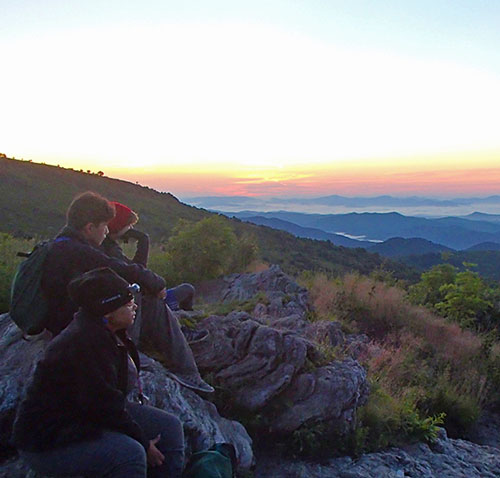
Intercept courses are designed to develop positive decision-making skills, strengthen interpersonal relationships and cultivate a positive self-image.
How Do Families Find Intercept?
Most of the families who find their way to an Outward Bound Intercept course do so by talking to others that have experienced Outward Bound in other ways, or who are familiar with the organization and its goal of changing lives through challenge and discovery. Sometimes it’s alumni who recommend the program, sometimes it’s teachers, counselors or therapists who offer the idea as an option. Parents seeking solutions to a situation they see as hopeless or overwhelming ask for help in different ways and from different sources. Almost always, parents find Outward Bound through word-of-mouth recommendations. You have to do it to know what it can do for you.
“Someone knows someone who has taken an Outward Bound course and they’ve heard about character-building, they’ve seen the difference in a young person’s confidence and they want that for their own child,” says Seth Ruggles, former Outward Bound Intercept outreach specialists. “Those outcomes are particularly appealing to families that are struggling and have conflict at home.”
What Do Intercept Students Have in Common?
Conflict is a commonality for those who are a good fit for Intercept programs. The student may be doing fine in school, but at home there are arguments and negative behavior traits that are disrupting the family life. The level of conflict or type of conflict in an Intercept student’s life varies, but the common thread is pushing boundaries within the closest circle of relationships, the family. Parents become concerned about dishonesty, lack of communication, decisions and accountability, an obsession with “screen relationships” in lieu of real face-to-face interaction and other core issues. Intercept courses are specifically designed to address those issues and open up new channels for handling them.
“Intercept experiences are judgement-free zones which allow students to open up and talk about things that they haven’t felt safe in doing before,” adds Ruggles. “On course, students come to terms with themselves, they work with the group, they start to look at opportunities differently and become committed to goals out there, and then they bring those new skills and goals home to use in other situations.”
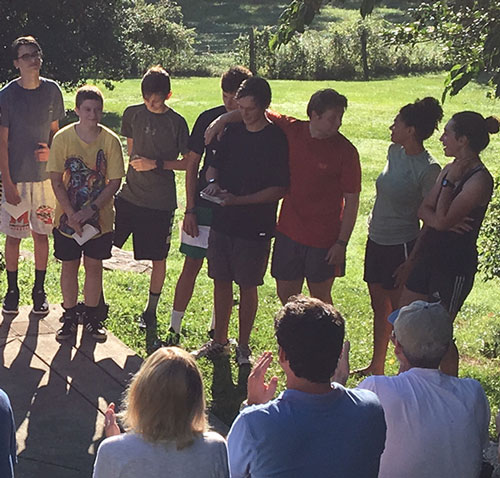
Outward Bound students improve relationship connections and create an environment of support with each other.
What Kinds of Teenagers Go on Intercept Courses?
Both parents and students are curious about the other kids who will be on a course. Will students learn more conflict behaviors from other students? What will the kids together be like? What have they all done to “get here?” Specifically for students, it’s important to know that Intercept is not a punishment, it’s an opportunity. Not every family has the means to send a student on an Intercept course, nor the commitment needed to making family life better, together. For those able and willing to try, Intercept can be a useful and liberating program to open up lines of communication and free relationships from stressful ruts.
Typical patterns of behavior in Intercept students include declining school performance, peer influence that is concerning, poor decision-making or self-confidence and many other areas of conflict. Intercept students have family members who want to intervene and help students find better ways of dealing with these conflicts, in a constructive place where discussions can be facilitated by an Instructor. Intercept Instructors encourage conversation about topics at hand and they take the time to explore the whys and why nots in a supportive, open environment. Intercept students have friction in their lives, and the program is specifically focused on supporting and helping create awareness around decisions and consequences, leading to healthier dialog and relationships going forward.
You can read more on this topic here.
Is Intercept the Right Fit for Us?
Whether Intercept is right for you depends on several factors. It depends on what is going on within the family and what the goals are. If the student is self-motivated to attend an Outward Bound course and parents aren’t overly concerned with relationships, they don’t need an Intercept course. Committing and investing in Intercept is a family commitment, not an individual one. At least one parent is required to attend the last three days of an Intercept course, and there’s a commitment agreement that both parents and students enter into before the course begins. Intercept is truly an investment in supportive outcomes for all involved.
“A lot of due diligence is involved to make sure that teens are good candidates and that the goals and outcomes are the right fit for the program,” commented Seth Ruggles when asked about the importance of course fit.
The length of course is also an issue when deciding whether Intercept is the right option to pursue. For 12 or 13 year-old students, the Intercept options are 20-day expeditions. Not everyone can take that kind of time away from their day-to-day lives. There are 28-day options for 14 to 17 year-olds and 17 to 21 year-olds, and even 50 day semester courses for those over the age of 17. It’s recommended that students primarily look at 22 days or more if they can, as the “longer they’re out there, the more impact it’ll have.”
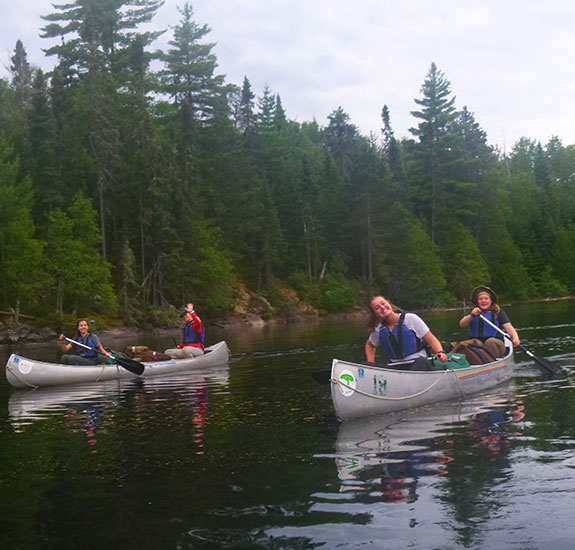
The longer Outward Bound students are on a course, the more impact it’ll have on their personal lives.
What Changes Do You Work On?
The differences between Teen Intercept courses (for 12 to 13 year-olds and 14 to 17 year-olds) and Young Adult Intercept courses are seen in more than just the age groups attending. Outward Bound Instructors lead the students to a set of objectives that they should be able to do by the end of the course. Beyond wilderness skills, these personal behavior objectives include elements like:
- Student assesses risks and benefits of decisions
- Communicates needs assertively to peers
- Can give feedback effectively, independent of Instructors, and can manage conflict with some guidance
- Understands personal role in the family and in family dynamics
- Student understands self motivation
For Young Adult Intercept students, the objectives include more self-awareness and independence, though the foundation is very similar for 12 or 13 year-old students who work on regulating their own emotions and communicating respectfully to authority figures. Across all three Intercept age groups, the emphasis on open communication, relationship health and decision-making consequences is ever present during their time on a course.
Can I Do It?
This is a multi-faceted question that both parents and students ask. Financially, physically and emotionally, does our family have what it takes to invest in this?
On the financial side, scholarships are available that can help defray some of the costs involved. If students apply for scholarship funds and the application is denied, they get a full refund, so it’s a risk-free option to explore. From Outward Bound’s perspective, Ruggles mentions that “we try to offer as many scholarship dollars as we can to each student, so that we can have as many students attend and benefit from the experience as possible.”
Physically, students need to figure out if they can participate in the activities that will be happening on course. If they’re used to sitting on the couch all day playing video games, they’ll want to start some physical activity prep work before they switch over to backpacking and hiking. The better in shape they come, the better prepared they’ll be for the wilderness experience.
Emotionally, all members of the family need to be ready for the commitment and change that Intercept brings. Parents often ask how they “make” their teens go on an Intercept course. The short answer is, you don’t. None of the students are on course if they’re not willing to be there.
Part of the application process for all Intercept courses is a parent-teen agreement that ensures that everyone involved is committed to the decisions, outcomes, support and accountability that comes with an Intercept expedition. After all, the whole family participates. There are goals and incentives in the agreement that are meaningful to both the student and the family. Follow-through and accountability are stressed during the course, and it starts with the agreement right at the beginning. There are stories about student graduates not accepting their pin (which they receive at a graduation ceremony) if they feel they haven’t properly earned it, a point of pride and personal accomplishment that many of them discover while they’re on course.
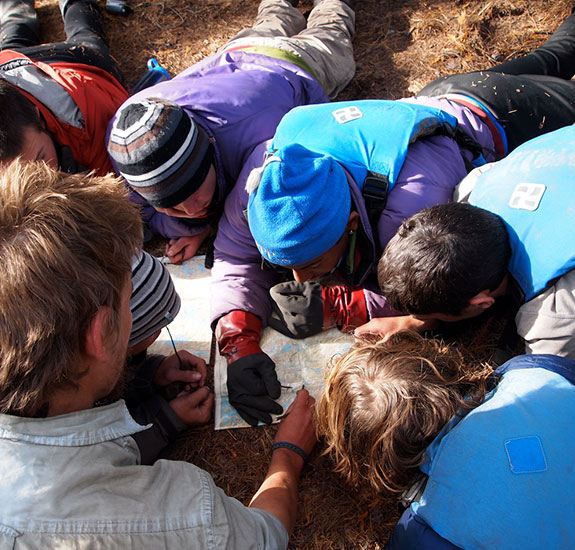
Outward Bound students are committed to the decisions, outcomes, support and accountability that comes with an Intercept expedition.
What Should I Expect?
Part of the process on the front end is to interview both the student and the family, sometimes involving counselors or therapists, to give everyone a chance to know what to expect and from whom. Students are told what they’re getting into, what the course will be like and what they can expect to go through when they’re out there. They want to know how big the group is, what they’ll eat, how they’ll go to the bathroom, if there will be bugs, what the Instructors are like…the whole layout. Students are told up front there will be circumstances that will test them, make them uncomfortable and push their boundaries in ways that they’ve not experienced before. If they’re ready for it, they’re better equipped to work through it.
Parents want to know about the Instructors too, and how they’ll accomplish things with the student that the family has been unable to. The Instructors are key to the process, as they provide an external perspective and neutrality that is key to helping Intercept families progress. They’re compassionate, patient and work with students in ways that meet their specific needs and goals, and they do it all with “unconditional positive regard.” Remember, this is a judgement-free zone. Instructors are facilitators and they create openness where blockages have existed.
Making sure that everyone has eyes-wide-open expectations sets the students up for success and puts many parents’ concerns to rest.
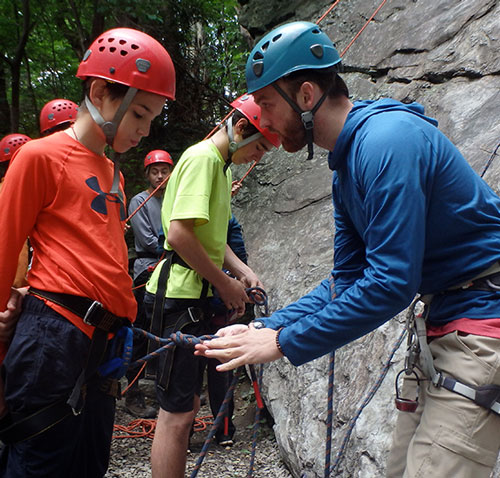
Outward Bound Instructors cultivate an environment of challenge and discovery.
Ruggles cautions that “In the end, not everyone gets accepted to the program. It’s not always the right time, or the needs of a particular student are out of our scope of practice. Our goal, in every case, is to set the teens, Instructors and families up for success on course and post-course.”
He continues by saying, “We reinforce that we’re not therapists. This is not a boot camp. This is a positive opportunity. You’ll be a little nervous and uncomfortable out there, and there will be times where you’ll want to quit – but you’ll find out what’s inside you, find some grit that helps get you through. Quitting may be easy, but it’s not necessarily the best option. Students discover or re-discover their strengths and skills on Intercept courses that they take home with them and that serve them well in many other aspects of their lives.”
How Do I Find Out More?
Intercept Expeditions are enrolling year-round. If it’s the right fit for your family, and you’re looking for a supportive environment to make a change, reach out and explore the possibilities.




